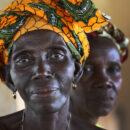Africa Insiders: Why Sudan is turning to the ICC to prosecute al-Bashir


Omar Al Bashir, former President of Sudan. Credit: Sebastian Baryli
The essentials: Last week, an official of Sudan’s transitional government announced that former President Omar al-Bashir could face charges of war crimes and crimes against humanity in front of the International Criminal Court (ICC). The announcement was light on details and heavy on caveats, but with more information emerging, it looks increasingly possible that al-Bashir will face justice in some form.
The details: Al-Bashir was indicted by the ICC in 2009 on counts of murder, extermination, forcible transfer, torture and rape (all crimes against humanity), directing attacks against civilians and pillaging (both war crimes), and genocide. All charges were brought in relation to the Darfur crisis, which has a history going back centuries but escalated into genocide perpetrated by Sudanese government forces and its allies against primarily non-Arab ethnic groups in 2003.
Al-Bashir, the first sitting head-of-state issued with an international arrest warrant for war crimes rejected the charges and declined to appear before the court. While the indictment contributed to Sudan’s international isolation, al-Bashir himself was only marginally inconvenienced by it. Especially Arab and African governments declined to enforce the warrant and allowed him to continue to represent Sudan on diplomatic missions.
The situation changed with his fall in April 2019. Elements of Sudan’s military conducted a coup against al-Bashir, placed him under arrest and entered into negotiations with an opposition movement that had paralysed the country with mass protests in the prior months. Members of the military and the opposition agreed on a joint transitional government and plans to negotiate a lasting national peace with various rebel groups.
Initial reports that al-Bashir, along with several alleged co-conspirators, would be handed over to the ICC came after somewhat vague remarks by a government spokesperson in the context of peace talks between the government and Darfur rebels. Now, a week later, a clearer picture emerges.
Both military and civilian leaders within the transitional government seem to be in favour of having al-Bashir face justice and involve the ICC in some capacity. These two issues are connected, but don’t necessarily depend on each other. That they are considered together likely stems from a desire to address both national and international priorities of the current Sudanese leadership.
Nationally, the transitional government has committed itself to finding a peaceful solution to the country’s many internal conflicts. This is likely a higher priority for civilian members of the transitional government, but even military officers likely understand and accept that peace in Darfur will have to involve some form of accountability of the former regime. Throwing al-Bashir to the wolves is probably more desirable to the generals than having the military’s entire record scrutinised.
Internationally, Sudan is still a de facto pariah state and cut off from important aspects of the global economy. While many sanctions have been lifted, Sudan’s status as a state sponsor of terrorism is maintained by the US government, limiting Sudan’s ability to address its economic crisis. Involving the ICC in a trial is a strong signal to the international community and will likely be linked directly or implicitly to commitments by the US and EU to provide financial assistance.
But while it seems more and more sure that al-Bashir will face some form of trial, it is unclear what form that will take. The unlikeliest scenario is for al-Bashir to be extradited to The Hague, as this would undermine the transitional government in the eyes of Sudanese nationalists. A likelier scenario would be an ICC-led or hybrid trial taking place in Sudan itself. This would retain the image of national sovereignty but also satisfy the international community.
The upshot: It wouldn’t be the first time the ICC has been used by a new regime to help with its own political agenda. But no matter the intentions, handing over al-Bashir in any form to the ICC will send a strong message. His continued dodging of his arrest warrant did a lot to undermine the ICC and brand it as ineffective. His trial could repair some of that damage and serve as a precedent for decades to come.
- The BBC’s original report on Al Bashir’s likely surrender to the ICC
- The ICC’s page on the Darfur investigation and all ongoing and closed cases
- Statement by the ICC’s prosecutor to the United Nations Security Council on the Darfur investigation from December 2019
- Two interesting Twitter threads by Yousra Elbagir on the situation.
- Omar al-Bashir: Will genocide charge against Sudan’s ex-president stick? (BBC)
- ICC trial in The Hague one option for Sudan’s Bashir -minister (Reuters)
Pay what you want for the FULL Africa Insiders Newsletter!
We send out multiple stories per week, including in-depth analysis of current elections and public health emergencies.
The Africa Insiders’ Newsletter is a collaboration between AfricanArguments.org and @PeterDoerrie, with contributions from @_andrew_green and assistance from Stella Nantongo. Part of the subscription revenue is funding in-depth and freely accessible reporting and analysis on African Arguments.






